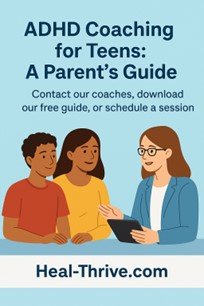ADHD Coaching for Teens: A Parent’s Guide
Parenting a teen with ADHD can feel overwhelming. “We don’t know how to help without nagging,” many parents tell me. If this sounds familiar, you’re not alone. Teens with ADHD aren’t being difficult on purpose, ADHD affects focus, motivation, and emotional regulation, making daily life challenging.
At Heal&Thrive, we help parents navigate these challenges with practical strategies and guidance, supporting teens to thrive academically, socially, and emotionally. This guide will give you actionable tips, real-life examples, and tools to help your teen succeed, from managing everyday routines to preparing for the transition to college.

Problem Identification:
Teens with ADHD face unique challenges:
- Motivation & resistance: Delaying tasks or refusing support does not equal laziness – it equals ADHD.
- Executive function struggles: Your teen requires assistance with organization, time management, attention, and goal-setting.
- Emotional & behavioral issues: Impulsivity, meltdowns, anxiety, and low self-esteem add unparalleled stress on families, at varying levels.
- Family stress & dynamics: Finding balance between independence and support often leads to parental burnout.
- Access to resources: Locating qualified coaches and communication with schools can be inundating.
- Life transitions: Social skills and college prep create new stressors.
These challenges are the first step in preparing a practical plan to support your teen, while also taking into consideration their unique personality differences. Heal&Thrive offers coaching resources and expert advice to assist families throughout the way.
Real Client Stories:
I recall working with a mother, let’s refer to her as Sarah, and her 15-year-old son who experienced issues with procrastination and general chaos in the mornings. Sarah felt like she was always nagging him to get things done, and often he would shut down or resist any help from her. We explored executive function coaching through Heal&Thrive and researched a process specifically for teenagers, and together we created a very simple morning checklist, we used timers to support completing each task, and we set small and achievable goals that made sense. A short time later, Sarah reported that her son was initiating the morning routine independently instead of waiting for her to remind him to do things. They were small wins, but became significant. Another family had a 16-year-old son named Jason who did not want to take ADHD medication, or any medication for that matter, because of societal stigmas or fear of side effects. His parents were stressed and worried about Jason’s performance in school. We coached this family on practicing open communication techniques and breaking tasks down into even smaller, manageable chunks. Over time, Jason intentionally began participating in the homework routine although he had not started medication yet. This helped him foster confidence and habits that supported his focus and productivity.

Practical ADHD Solutions for Parents:
Building Motivation and Reducing Resistance:
- Include your teen in creating goals: Allow your student to choose their reward when completing tasks.
- Divide tasks into smaller pieces: Long jobs can be cumbersome.
- Normalize ADHD: Discuss how many teens are experiencing similar challenges; this is not a “failure.”
Executive Function Coaching Strategies:
- Time management: Have them use a digital calendar, alarm, and timer.
- Organization: Purpose-made folders, color-coded bins, and workspace designs all help less clutter.
- Focus and task completion: Practice focused sessions and breaks (Pomodoro technique).
- Future thinking & goal-setting: Start out simple with weekly goals then move towards longer goals like planning for college in learning tasks and projects.
Emotional Regulation & Behavioral Tools:
- Use mindfulness exercises together to mitigate impulsiveness and anxiety.
- Teach self-awareness: Ask your teen to name their feelings and their triggers when they are upset.
- Put a “cool-off” routine into place during a breakdown or example of the breakdown opposed to excessive punishment.
Family Dynamics & Parental Stress Management:
- Shift from control to collaboration: Ask your teen for their suggestions on the routines to implement.
- Give all siblings a turn for attention to alleviate resentfulness.
- Parents should focus on self-care practice and acknowledge their best efforts, as burnout helps no one.
Accessing Resources & Practical Barriers:
- Look for certified ADHD coaches via pediatricians or support groups.
- Think about seeking online or group coaching sessions for less cost.
- Align support under the school plan, IEP, and therapy for consistency.
Preparing for Transitions & Social Skills:
- Role play social situations to practice peer interactions.
- Promote small responsibilities to grow independence and confidence.
- Start preparing your teen for college and the transition beyond high school.
Common Challenges Parents Face with ADHD Teens
Teen Resistance & Motivation Issues
- Challenge: Teencan become unengaged by being told what to do, may resist help, or avoid doing what’s asked or needed.
- Fix: Use collaborative goal-setting. Allow teens to have input on rewards and set those up as well as break down tasks and activities. Normalize attention-deficit hyperactivity disorder (ADHD) as a basic condition. Embrace and emphasize small wins to build confidence.
- Example: One family we worked with at Heal&Thrive began a weekly “success check-in” where the teen set their own goals. Over time, the teen was willing to become engaged, and conflicts decreased in the home.
Executive Function Deficits
- Challenge: Find it difficult to manage time, organize, focus, or think ahead.
- Fix: Use digital calendars, alarms, color-coded systems, or timed focus break systems. Start with small “achievable” goals and gradually build in complexity. Coaching can help monitor the teen to keep them on task.
Emotional and Behavioral Challenges
- Challenge: Impulsivity, throws tantrums, anxious behaviors, low self-esteem all can disrupt family harmony.
- Fix: Incorporate mindfulness practices, emotional labeling, regulate safe spaces, give regular feedback, create and implement a reward system.
Family Stress & Parental Burnout
- Challenge: The ongoing reminders, sibling squabbles, and worry about allowing your child to “take a break” can deplete parents.
- Fix: Shift from a power model towards a collaboration model. Parents engage in self-care and re-evaluate expectations. Allow caregivers to share responsibilities and encourage siblings to engage positively in behaviors.
Resource Access & Practical Barriers
- Challenge: Identifying qualified ADHD coaches and collaborating with the school or therapeutic setting can present challenges.
- Fix: Use resources like Heal&Thrive to establish certified coach/es, online programs, and/or group coaching. Collaborate with teachers and support staff in an IEP or therapy setting to coordinate a common plan to approach the study.
Preparing for Life Transitions
- Challenge: Teens will have difficulty preparing for college-style classes, social interactions, and transitions to independence.
- Fix: Role-play real-life scenarios, introduce small levels of gradually responsibility, and troubleshoot the long-term plan. Encourage peer-mentoring or group coaching to address social skills.
Success Metrics for ADHD Coaching in Teens
To know whether coaching is working, parents can track measurable improvements:
- Task Completion: Your teen will be more likely to independently complete their homework or chores without being reminded.
- Emotional Regulation: Your teen has fewer meltdowns and an increased ability to self-soothe when feeling frustrated.
- Time Management: Your teen uses planners, alarms, and timers to meet their deadlines.
- Motivation & Engagement: Your teen is more likely to start a task without being nudged or reminded.
- Family Harmony: Less conflict, improved family conversations, and a better relationship between siblings.
- Long-Term Independence: Your teen is ready for college, part-time job, or to manage their own responsibilities at home.
At Heal&Thrive, we emphasize small, incremental progress instead of perfection. Keeping track of these metrics assists families in identifying the wins and helps to modify strategies when necessary.
Parenting a teenager with ADHD is challenging, but it is also an opportunity to support your teenager in cultivating life skills and independence, and confidence. Heal&Thrive provides expert consultation, personalized coaching, and practical tools to help families navigate ADHD.
Here’s how you can take action today:
- Contact Our Coaches: What better way to make progress than to connect and work directly with certified ADHD coaches to design an individualized plan for your teenager?
- Download Our Free Parent Guide: Get actionable steps on ADHD management, executive functioning skills, and transition to adulthood.
- Schedule a Session: Book Session. Schedule a one-on-one coaching session with a coach and begin using practical strategies right away.
Keep in mind that ADHD coaching for teens is not about achieving perfection, it’s about making progress. Notice small victories, measure improvements, and if needed, start brainstorming alternative strategies. Your teen can excel academically, socially, and emotionally when provided with the appropriate support and guidance.
Final Thoughts:
Every teen is different, and ADHD affects every teen differently. By establishing a good balance of organizational strategies, executive function coaching, and social-emotional support, parents can help their teen overcome the challenges they face in order to reach their full potential. Heal&Thrive is here to help you every step of the way; no parent should navigate the ADHD journey alone.

